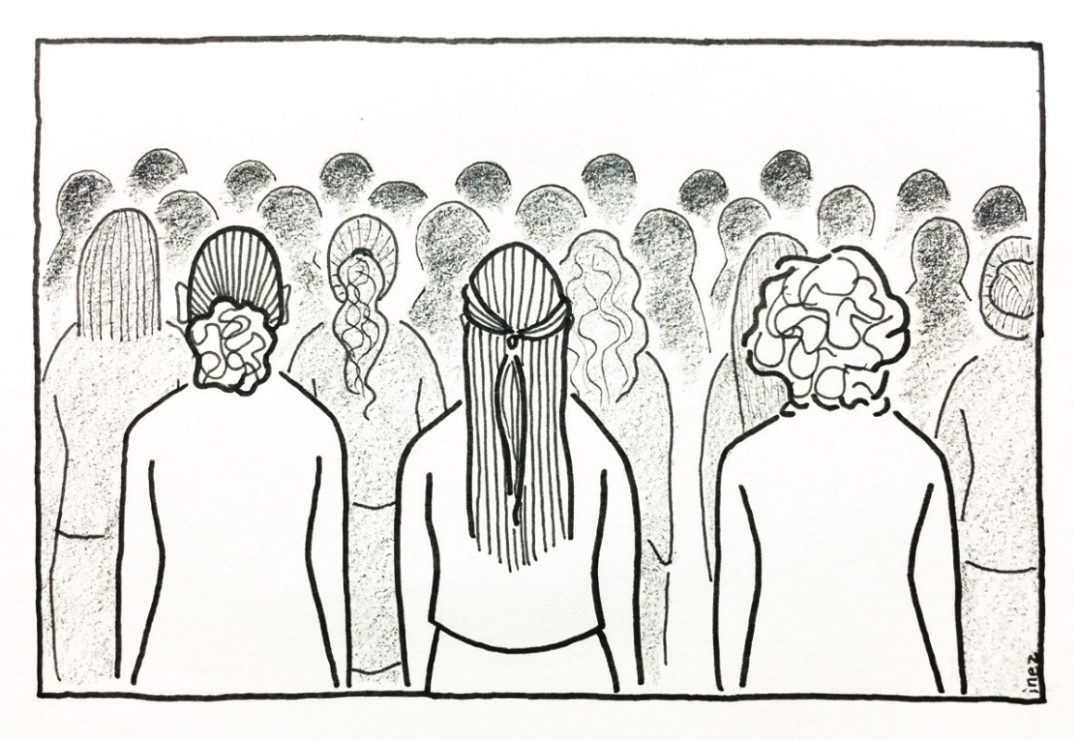The Daughters of the Vote event in Ottawa was more politically-charged than usual this year

On April 3, 338 young women took their seats in the House of Commons for the Daughters of the Vote event. Equal Voice, a multi-partisan organization, organizes Daughters of the Vote as part of their greater mission of supporting gender equality in politics.
The event, and some students from UVic, made national news after some delegates left the room when leader of the Conservative party Andrew Scheer spoke to them in the House of Commons, and approximately 30 delegates turned their backs during Prime Minister Justin Trudeau’s speech.
Earlier that morning, Trudeau announced that former high-ranking ministers Jody Wilson-Raybould and Jane Philpott had been removed from the Liberal caucus. This was in response to the SNC-Lavalin affair: Wilson-Raybould accused the Prime Minister’s Office of politically pressuring her in her role as Attorney General, and Philpott sided with her. The political insurgency led Trudeau to say there was a loss of trust within caucus.
[There are] many barriers that still persist for women in politics such as sexist media coverage based on appearances, women in politics being called “honey” or “sweetie”, and an “Old Boys Club” mentality.
Six UVic students were chosen to represent their ridings at the Daughters of the Vote event. The Martlet had a chance to speak with three of these individuals (Alexandra Ages, Astra Lund-Phillips, and Skye Lacroix) about women in politics, and the firsthand account from that eventful day in the House.
26.9 per cent of the seats in the House of Commons are held by women, placing Canada 62nd worldwide for gender equity. The three students spoke to the many barriers that still persist for women in politics such as sexist media coverage based on appearances, women in politics being called “honey” or “sweetie”, and an “Old Boys Club” mentality. Ages stressed that these barriers have to be seen through an intersectional lense. Lacroix, an Indigenous woman, spoke to the lack of Indigenous women in politics — a problem, she says, “that needs to be revolutionized”.
The Daughters of the Vote enabled Ages, Lund-Phillips, and Lacroix to brush shoulders with various Members of Parliament and hear statements from the leaders of each party. For Ages and Lacroix, this moment allowed them to send a message to Scheer and Trudeau about feminism and reconciliation, or a lack thereof.
Lacroix stood up and turned her back to Trudeau, and left the room during Scheer’s address. She was joined by other delegates, including many of the other Indigenous women in attendance. According to Lacroix, Scheer had voted against bringing the Daughters of the Vote delegates to Ottawa, and she “didn’t want to hear what Scheer had to say about gender equality.”
“When you see people like Jody Wilson-Raybould being kicked out of caucus, you see the one Indigenous person that is in the highest position of power being removed from that spot and demoted.”
“When you see people like Jody Wilson-Raybould being kicked out of caucus, you see the one Indigenous person that is in the highest position of power being removed from that spot and demoted,” said Lacroix.
Ages was motivated for similar reasons — she stood up and turned her back to Trudeau following the lead of some Indigenous delegates, and she refused to look at Scheer while he spoke.
She was motivated by “Unist’ot’en, and the hypocrisy that was coming out of Trudeau’s mouth as he talked about reconciliation … [but] it was really the strength and power of the Indigenous delegates that compelled me to turn.”
As for her motivations behind rejecting Scheer, Ages said that the Conservative party’s policies to do not support marginalized groups.
“His party’s policies are incredibly damaging to marginalized people, and I really didn’t want to hear him stand and preach empty words about feminism.”
When asked if her act of protest was partisan, Ages countered that it was about “broken promises and the hypocrisy” more than anything.
Despite speaking openly about her actions, Ages has received little backlash. The same cannot be said for other delegates, particularly Muslim and Indigenous delegates, who have received hateful and racist harassment online since the event, said Ages.
While Lund-Phillips was caught off guard and did not participate, she later tweeted that media coverage was focusing on the protests towards Trudeau rather than Scheer, and minimizing an important event about gender equality to one about Trudeau.
“It’s incredibly telling that the people that have overwhelmingly supported Jody Wilson-Raybould are women and Indigenous peoples.”
In his statement, Trudeau clearly cited the SNC-Lavalin affair in his address to the Daughters of the Vote.
“I know nobody in here wants to have to pick who to believe between Jody Wilson-Raybould and Chrystia Freeland,” he said.
Both Ages and Lund-Phillips expressed their uneasiness about the way Trudeau framed the issue as women against women.
“It’s incredibly telling that the people that have overwhelmingly supported Jody Wilson-Raybould are women and Indigenous peoples,” said Lund-Phillips.
“They are groups that are so used to having their voices silenced, being told how to act and not believed when they speak truth to power, that when they see this in the SNC-Lavalin case, they are quick to speak out against it.”
When asked if they’d consider running for office, the three women said it was not in their immediate plans. But Lacroix had some simple, powerful advice for young women in politics:
“Don’t be afraid to have your voice heard.”






